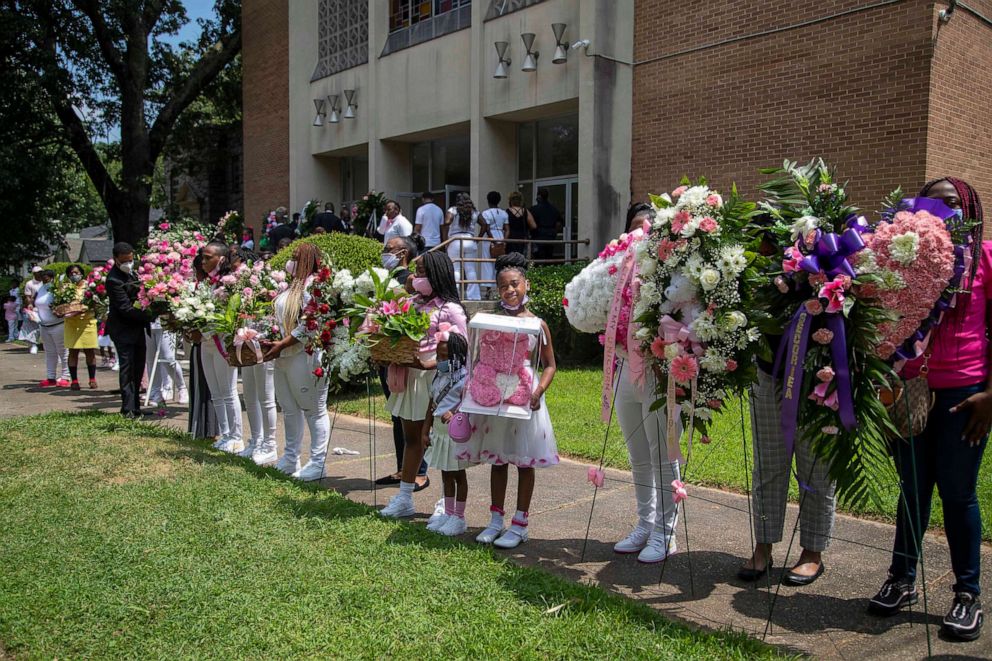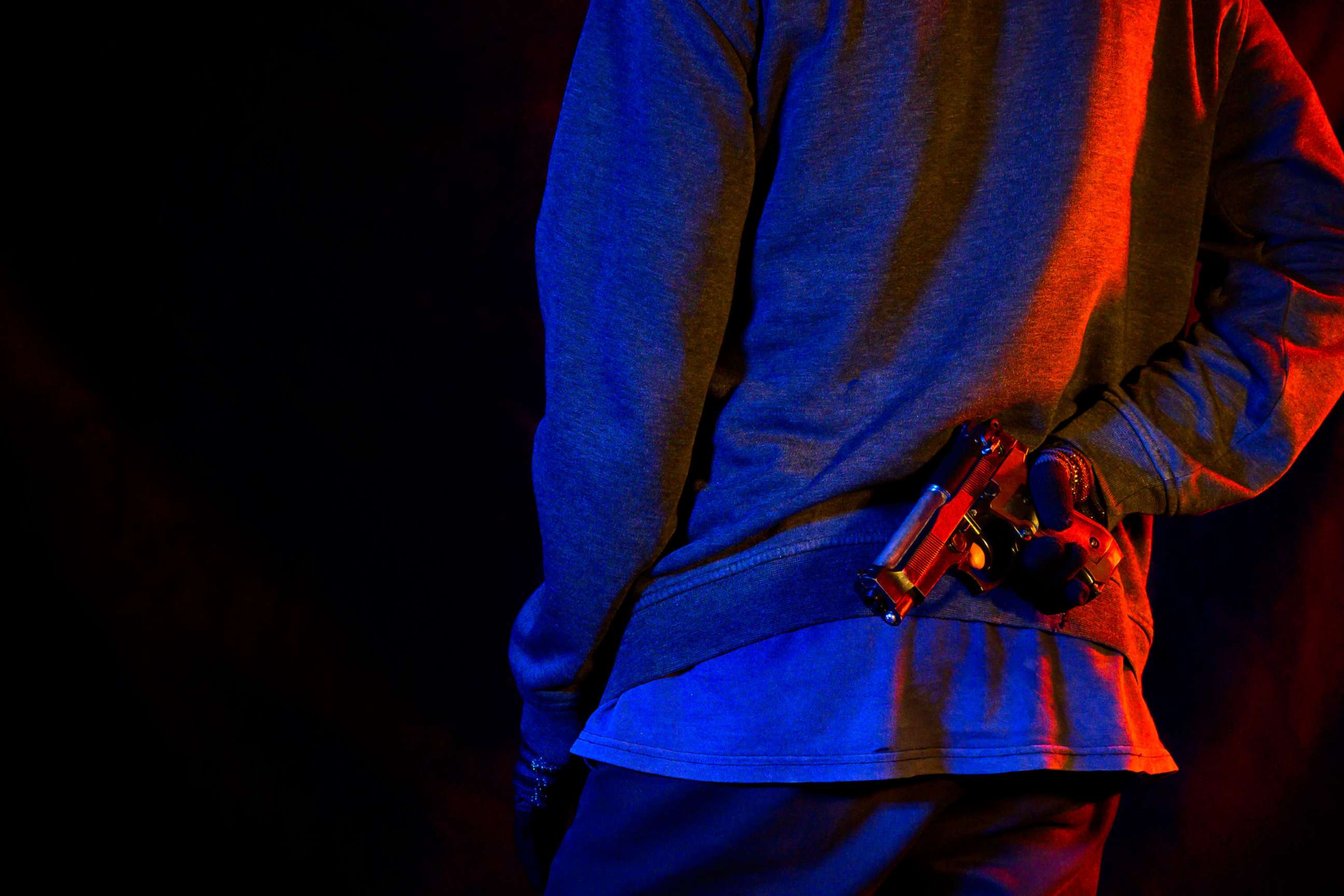'Black-on-Black crime': A loaded and controversial phrase often heard amid calls for police reform
It's a retort sometimes heard in the context of the protests.
"But what about Black-on-Black crime?"
It's a retort sometimes heard in the context of the protests surrounding the death of George Floyd and Black Lives Matter -- often as the idea that there is a rampant crime problem within Black (and mainly urban) communities that some are choosing to ignore in favor of focusing on police brutality.
It's a question sometimes asked in the context of recent news stories such as the drive-by shooting of 15 funeral mourners in the predominately Black Chicago neighborhood of Auburn Gresham. The deceased, Donnie Weatherby, a Black man, was killed in an earlier gang-related shooting, police said.
It's a phrase or a concept that at times, recently, has been used by some conservatives to ask why the same activists and community members calling for police reform seemingly, in their view, don't express the same outrage when someone who is Black is killed or injured by another Black person.
In 2015, Donald Trump, when he was a candidate for president, tweeted a misleading graphic that claimed that 97% of Black people killed are killed by other Black people, and that 80% of white people killed are killed by Black people.
Fact checkers deemed the tweet as promoting false statistics. The tweet was "quickly revealed as erroneous" according to the Washington Post. From the FBI's Universal Crime Report in 2014; 90% of Black people killed were killed by other Black people and 14.8% of white people killed were killed by Black people.
The phrase is not only used by white people but also by some Black people calling out crime in their communities.
John Ayala reportedly used the phrase after his grandson, 11-year-old Davon McNeal, was fatally shot during a Fourth of July cookout in Washington, D.C., according to The Associated Press. The family is Black, as per Ayala's social media, as are the suspects in McNeal's death.
"We're protesting for months, for weeks, saying, 'Black Lives Matter, Black Lives Matter.' Black lives matter it seems like, only when a police officer shoots a black person. What about all the Black-on-Black crime that's happening in the community?" asked Ayala, in a video posted to grabien.com.
ABC News reached out to Ayala to confirm his statement, but has yet to receive a response.
In the case of 9-year-old Devante Bryant, who was fatally shot in New Orleans earlier in July, New Orleans Police Superintendent Shaun Ferguson, who is Black, pleaded with the community for an end to what he called "senseless violence" and "Black-on-Black" crime, reported Fox 8 News.
And after the death of 8-year-old Secoriea Turner, allegedly by a Black teen, two Black Atlanta City Council members used it as well.

"If Black lives matter, they have to matter all the time," and "Black-on-Black killing, any killing that is unnecessary, they all matter," they said.
Those who use the term say it is an important point in describing the disproportionate amount of crime perpetrated by Black people against other Black people.
However, there are activists and academics who say that "Black-on-Black crime" is an offensive phrase; its origins rooted in America's racist legacy and meant to demean Black people as criminally inclined.
Some also say it is misleading -- white people are mainly killed by white people, they say -- but there is no conversation about "white-on-white" crime.
'Black-on-Black crime': The history of the phrase
The earliest modern references to Black-on-Black crime came from Black media. In 1979, Ebony magazine, the first commercially successful Black-owned magazine focusing on the African American community, featured an article about Black-on-Black crime.
"Although the Black community is not responsible for the external conditions that systematically create breeding grounds for crime, the community has the responsibility of doing what it can to attack the problem from within," the article from the August 1979 issue read.
Black Enterprise magazine, a Black-owned publication focusing on Black business and economics, also referenced Black-on-Black crime in its June 1979 issue. "You might not know it from reading the daily newspaper or watching the evening news on television, but most big-city crime is committed by blacks upon blacks," an article in the issue stated.

While the first widespread use of the phrase "Black-on-Black crime" can be traced back to the 1970s, the notion that Black people have inherent, collective proclivities to commit crime against others, including other Black people, goes much further back than that, says historian and professor of history, race and public policy at Harvard Kennedy School, Khalil Gibran Muhammad.
"The idea that Black people kill each other is exceptional or something that can only be fixed by Black people is deeply rooted in the white supremacist past," Muhammad told ABC News.
The specific notion of "Black-on-Black crime" gained traction in a book published in 1896 titled, "The Race Traits and Tendencies of the American Negro," according to the professor. The author, Frederick L. Hoffman, did not use the specific phrase in the book, but promoted "the basic idea that Black people have a special crime problem," Muhammad added.
And as one of America's leading statisticians at the time, Hoffman was one of the first to use crime statistics to support what he considered evidence of a Black crime problem.
The Bureau of Justice Statistics' 2019 crime victimization statistics report shows those who commit violent acts tend to commit them against members of the same race as the offender.
Offenders were white in 62% of violent incidents committed against white victims, Black in 70% of incidents committed against Black victims and Hispanic in 45% of incidentscommitted against Hispanic victims, according to the BJS report.
Yet, Muhammad said, it's only "Black-on-Black crime" that is put under the microscope and used as an excuse to create more aggressive policing polices and higher rates of incarceration of Black people.
"We certainly understand when someone makes a categorical claim about an entire group of people as a race of criminals, that that is in fact a racist idea," Muhammad said.
Muhammad said he is not denying the disproportionate rates of crime in the Black community, which the BJS statistics also show. But he takes issue with the idea of "Black-on-Black crime" being used to counter the notion that there is systemic racism.
Muhammad pointed to the case of European immigrants. A wave of immigration in the late 1800s to early 1900s, mostly people coming from European countries including Italy and Ireland, stoked resentment and sparked accusations of increased crime in immigrant communities similar to what Latino immigrants face from some politicians today.
But the response back then, said Muhammad, was increasing economic opportunity, police reform and giving those newcomers a piece of the American Dream by helping them own their own homes.
"A lot of the post-World War II programs like the GI Bill, the VA benefit … FHA housing -- were intended to help white people who were struggling in society so that their crimes would go down and their incomes would go up," he said.
Muhammad cited the plight of European immigrants who came to America in the late 1800s to 1900s. Maligned when they arrived, they strove to become accepted in American society.
African Americans have had more difficulty gaining the same acceptance that white immigrant groups have because of America's racist legacy, he said.
"Black people didn't get economic investment. They got more policing and more prisons," said Muhammad.
The 'Black-on-Black' crime trope as political weapon
Critics of the phrase also make the claim that the idea of "Black-on-Black crime" has been used as a political weapon by both Republicans and Democrats alike.
Ushering in the Neoconservatism of the 1980s, President Ronald Reagan's "War on Drugs," resulted in more policing and jailing of Black people, the critics point out, adding that dog-whistle language about rampant crime in the inner-city, mostly by conservatives, helped perpetuate the "Black-on-Black crime" trope.
In 2016, Black Lives Matter activists confronted Bill and Hillary Clinton over her use of the phrase "super predators" in a 1996 speech about crime. Although Clinton never referenced race in the speech or used the phrase "Black-on-Black crime," activists demanded an apology over what they considered coded language criminalizing Black people, in particular Black youth.
However, Muhammad contends that it's Black people who have pushed the phrase the most.
The Black conservative take
"The greatest danger for Black men in America is not a police officer, not somebody in a blue uniform, by any stretch of the imagination -- it doesn't even compare. The greatest danger for a Black man in America today is another Black man," said E.W Bishop, an African American minister and lawyer who identifies as a conservative, on his podcast in October 2019.
In his essay, "Challenges for Black People," economics professor Walter E. Williams, who is affiliated with George Mason University, also referenced "Black-on-Black crime," writing, "Black people need to have frank conversations among ourselves, no matter how uncomfortable and embarrassing the topics may be." Williams even suggests that Black people should patrol their own neighborhoods armed, and "ignore the liberal agenda."
And firebrand Milwaukee County Sheriff David Clarke told Fox News that Black people should be most afraid of "being on the street in any American ghetto where the Black-on-Black crime is a bigger threat and bigger problem in the community then the police use-of-force."
A look at the biographies of some of America's most prominent Black conservatives seems to show them typically to be older people. Muhammad said there is definitely a generational difference between Black people who use the phrase and ones who criticize it.
"Black people can also articulate racist ideas, and in the Trump era a lot more of them are," he said of some of those who self-identify as Black conservatives.
However, older Black people who use the term "Black-on-Black" crime are not necessarily conservative, he said.
"A liberal-leaning Democratic-voting socially conservative, older black person will also use the term," said Muhammad.
He said many of these older Black Americans use the term "to say, I care about my people, I don't want to see them hurting each other. What should we be doing to help," Muhammad said.
Still, for academics like Muhammad and many Black activists, the phrase should be stricken from the American lexicon.
Critics of the phrase often make the point that while white men are overrepresented in committing domestic acts of terror and white-collar financial crimes, which have serious consequences, the term "white-on-white crime" is never used in those cases. Those acts are as committed by an individual and not representative of a group.
"Black people are committing crimes against themselves or causing harm in the community. There must be something wrong with Black people -- that's the conversation unfortunately, that we're still having," said Muhammad. "And that is the racist legacy of the past repeating itself."
Editor's note: The data on Black people killing other Black people, and Black people killing white people countering President Trump's 2015 tweet, has been updated. The data initially cited, was incorrectly used because it excluded homicides.



